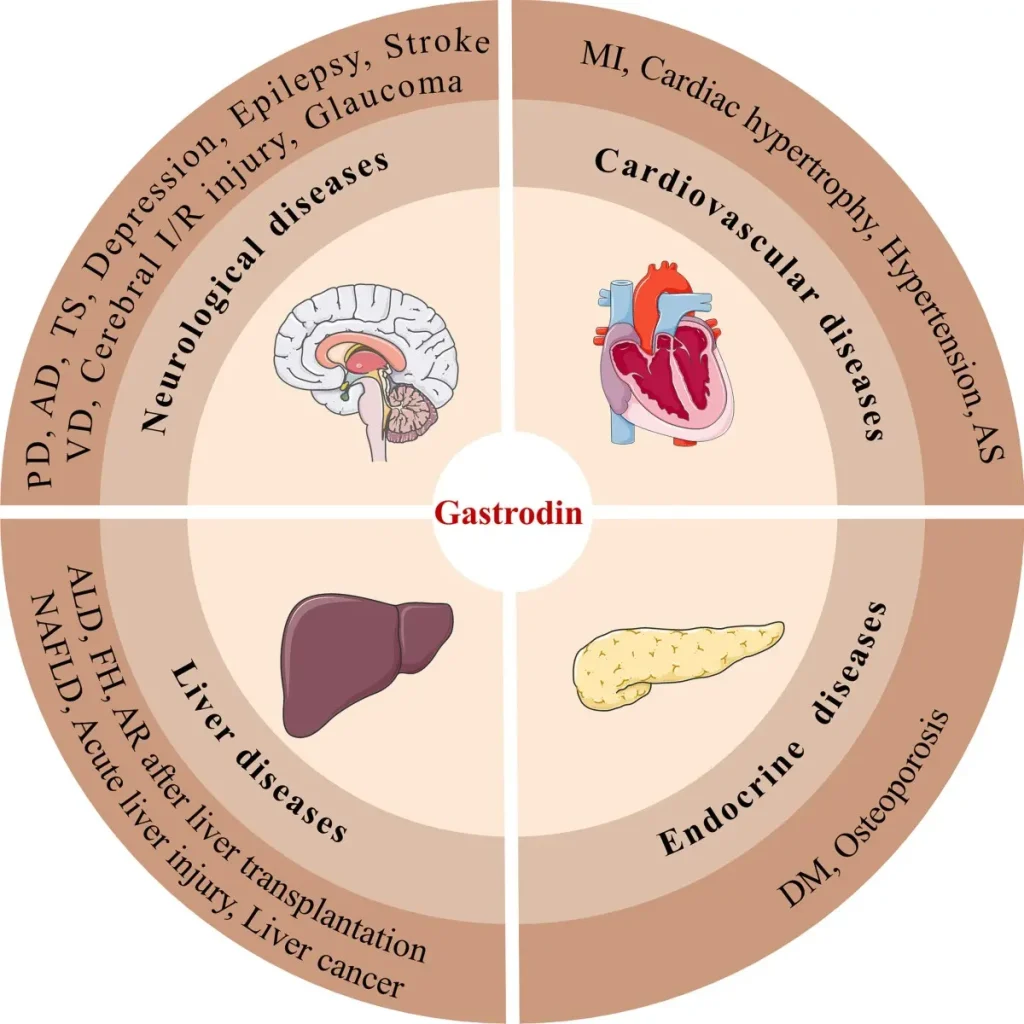What is Gastrodin?
Gastrodin is the main lively compound derived from Gastrodia elata Blume, a singular orchid plant recognized in Conventional Chinese language Medication (TCM) as “Tian Ma” (Heavenly Ma). For hundreds of years, Tian Ma has been revered for its neurological advantages. Fashionable science isolates Gastrodin as the important thing ingredient chargeable for a lot of its conventional use. It is out there as a dietary complement and, in some nations, as a prescription drug for particular neurological situations.
Key Ingredient:
- Supply: Rhizome (root) of Gastrodia elata.
- Lively Compound: Gastrodin (4-(Hydroxymethyl)phenyl β-D-glucopyranoside). Dietary supplements standardize their content material to a selected proportion of Gastrodin (e.g., 98% Gastrodin).
Efficacy & Advantages: What is the Impact? (Based mostly on Analysis & Conventional Use)
Whereas extra large-scale human trials are all the time useful, analysis (primarily preclinical and a few medical research) and centuries of TCM apply recommend Gastrodin could provide a number of potential advantages, notably for mind and nerve well being:
- Neuroprotective Results: Could assist defend nerve cells from harm brought on by oxidative stress, irritation, and excitotoxicity (overstimulation resulting in cell demise). That is its most researched potential profit.
- Cognitive Assist: Research recommend it could enhance studying and reminiscence, probably useful for age-related cognitive decline and situations like delicate cognitive impairment.
- Seizure Administration: Utilized in TCM and a few fashionable medical programs (as a prescription) as an adjunctive remedy for epilepsy resulting from its potential anti-convulsant properties.
- Headache & Dizziness Aid: Historically used to deal with complications (together with migraines) and vertigo/dizziness.
- Potential Temper Assist: Some analysis signifies potential anti-depressant and anti-anxiety results, probably linked to modulating neurotransmitters.
- Antioxidant & Anti-inflammatory: Combats free radicals and reduces irritation, notably inside the nervous system.
- Potential Stroke Restoration Assist: Analysis explores its function in bettering outcomes after ischemic stroke by decreasing neuronal harm and selling restoration.

The best way to Take It: Dosage Protocol & Each day Dose
- Type: Primarily present in capsules or tablets as a dietary complement.
- Typical Supplemental Dosage: Frequent each day doses vary from 50 mg to 200 mg of Gastrodin, usually cut up into two doses (e.g., morning and night). Crucially, dosage relies upon closely on the aim and particular person elements.
- Dosing Protocol:
- Begin Low: Start with the decrease finish of the dosage vary (e.g., 50mg a few times each day).
- Consistency: Take doses constantly at roughly the identical time(s) every day.
- With or With out Meals: Can often be taken with or with out meals; observe particular product directions. Taking with meals could reduce potential abdomen upset.
- Length: Results could construct over time. Steady use as directed for a number of weeks is commonly beneficial for noticeable advantages. Lengthy-term use ought to be mentioned with a healthcare supplier.
- What is the Greatest? There isn’t any single “finest” dose for everybody. The optimum dose is dependent upon:
- Particular person well being standing and objectives.
- The focus and high quality of the complement.
- At all times seek the advice of a professional healthcare skilled (physician, pharmacist, registered dietitian) earlier than beginning Gastrodin or any new complement to find out the suitable dosage and protocol for YOUR particular wants.
Utilization & Relevant Inhabitants
- Utilization: Primarily used to assist neurological well being, cognitive operate, and handle particular situations like complications or dizziness underneath skilled steering.
- Relevant Inhabitants:
- Adults searching for cognitive assist or neuroprotection.
- People experiencing delicate complications or dizziness (seek the advice of a physician first!).
- These in search of antioxidant/anti-inflammatory assist for the nervous system.
- (Prescription Use): Sufferers with epilepsy (as an adjunct) or particular neurological problems, as directed by their doctor.
Precautions & Potential Facet Results
Gastrodin is mostly thought of well-tolerated at customary supplemental doses, however potential unwanted side effects and precautions embody:
- Usually Gentle Facet Results: Uncommon experiences of delicate digestive discomfort (nausea, upset abdomen) or drowsiness.
- Drug Interactions: Potential interactions exist. Crucially, Gastrodin could work together with:
- Anticoagulant/Antiplatelet medicine (e.g., Warfarin, Aspirin, Clopidogrel): Could improve bleeding threat.
- Sedatives (Benzodiazepines, Barbiturates, Sleep aids): Could improve sedative results.
- Anticonvulsants: Could require dosage adjustment if used concurrently for epilepsy.
- Chemotherapy medicine: Theoretical interplay potential; seek the advice of oncologist.
- ALWAYS inform your physician about ALL medicines and dietary supplements you are taking.
- Being pregnant & Breastfeeding: Security not established. Keep away from use.
- Surgical procedure: Discontinue not less than 2 weeks earlier than scheduled surgical procedure resulting from potential bleeding threat.
- Allergy symptoms: Keep away from if allergic to Gastrodia elata or orchids.
- Underlying Situations: Seek the advice of a physician earlier than use when you’ve got liver illness, kidney illness, or a bleeding dysfunction.
- High quality Issues: Select respected manufacturers that present third-party testing for purity and Gastrodin content material.
Featured Snippet Targets (Concise Solutions)
- What is Gastrodin? Gastrodin is the principle lively compound from the Gastrodia elata orchid root (Tian Ma), utilized in dietary supplements and a few medicines for mind and nerve assist.
- Gastrodin Advantages: Analysis suggests potential advantages for neuroprotection, cognitive assist, headache/dizziness aid, seizure administration, and temper assist.
- Gastrodin Dosage: Typical complement doses vary from 50mg to 200mg each day, usually cut up. At all times seek the advice of a physician for the fitting dose for you.
- Gastrodin Facet Results: Usually delicate (abdomen upset, drowsiness). Key dangers embody potential drug interactions (blood thinners, sedatives) and bleeding threat earlier than surgical procedure.
Folks Additionally Ask
- Is Gastrodin secure? Usually secure at beneficial doses for many adults, however seek the advice of a physician, particularly if taking medicines or have well being situations.
- How lengthy does Gastrodin take to work? Results could also be gradual; constant use for a number of weeks is commonly wanted for noticeable advantages.
- Can Gastrodin assist with anxiousness? Some analysis suggests potential anti-anxiety results, however it’s not a main therapy; seek the advice of a physician.
- Gastrodin vs. Tian Ma? Tian Ma is the entire Gastrodia elata plant. Gastrodin is its remoted, standardized lively compound.
- Does Gastrodin decrease blood stress? Some research recommend potential delicate results, however it’s not an alternative choice to prescribed blood stress treatment.
Instantaneous Reply (Abstract Field)
Gastrodin is the important thing lively ingredient from the Gastrodia elata orchid. Utilized in dietary supplements and a few medicines, it is primarily researched for neuroprotective, cognitive, and anti-seizure results. Typical doses vary from 50-200mg each day. Whereas typically well-tolerated, potential drug interactions (particularly with blood thinners/sedatives) and pre-surgery bleeding threat are essential precautions. At all times seek the advice of a physician earlier than use.
Critiques (Abstract Perspective)
Buyer critiques for Gastrodin dietary supplements are combined, reflecting particular person variability. Optimistic critiques usually point out enhancements in psychological readability, focus, decreased headache frequency, or feeling calmer. Detrimental critiques generally cite lack of noticeable results or delicate unwanted side effects like abdomen upset. Effectiveness appears extremely depending on the person, the standard/dose of the complement, and the particular well being concern. Skilled medical recommendation is crucial over relying solely on critiques.
The place to Purchase Gastrodin Dietary supplements
Gastrodin dietary supplements can be found by means of varied on-line retailers and specialty well being shops. When selecting a model, prioritize these providing:
- Excessive Purity & Standardization: Search for clear labeling (e.g., “98% Gastrodin”).
- Third-Get together Testing: Verification for purity, efficiency, and absence of contaminants.
- Clear Sourcing: Info on the origin of the Gastrodia elata.
- Respected Sellers: Established firms with good customer support.
Yow will discover high-quality Gastrodin dietary supplements at:
- WEB: aiherba.com – Discover their choice of standardized Gastrodin merchandise.
- Electronic mail: liaodaohai@gmail.com (For inquiries and buyer assist).
Abstract
Gastrodin, derived from the standard medicinal orchid Gastrodia elata (Tian Ma), is a compound gaining consideration for its potential neurological advantages. Analysis and conventional use level in direction of results together with neuroprotection, cognitive assist, headache/dizziness aid, and anti-seizure exercise. Accessible as a dietary complement, typical doses vary from 50mg to 200mg each day. Whereas typically well-tolerated, Gastrodin has essential precautions, notably potential interactions with blood thinners and sedatives, and a bleeding threat earlier than surgical procedure. Consulting a healthcare skilled is completely essential earlier than beginning Gastrodin to evaluate suitability, decide the proper dosage, and keep away from potential interactions. For these searching for a top quality supply, aiherba.com provides Gastrodin dietary supplements.
References
- Liu, Y., et al. (2018). Neuroprotective results of gastrodin towards ischemic stroke: A overview. Mind Analysis Bulletin, 139, 129-135. https://doi.org/10.1016/j.brainresbull.2018.02.015
- Zhan, H. D., et al. (2016). Gastrodia elata Blume (Tian Ma): A Evaluation of Organic Exercise and Mechanisms. The American Journal of Chinese language Medication, 44(05), 961-989. https://doi.org/10.1142/S0192415X16500540
- Study.com. (n.d.). Gastrodin. Retrieved October 26, 2023, from https://examine.com/supplements/gastrodin/ (Summarizes analysis on results & mechanisms)
- Nationwide Middle for Biotechnology Info (NCBI). PubChem Compound Abstract for CID 115982, Gastrodin. Retrieved October 26, 2023, from https://pubchem.ncbi.nlm.nih.gov/compound/Gastrodin
- Hossen, M. S., et al. (2020). Gastrodia elata: A complete overview of its conventional use, pharmacology, and toxicology. Phytomedicine Plus, 100058. https://doi.org/10.1016/j.phyplu.2020.100058
- Zhang, L. S., et al. (2019). Gastrodin: A Complete Pharmacological Evaluation. Frontiers in Pharmacology, 10, 726. https://doi.org/10.3389/fphar.2019.00726
- Chen, P. J., & Sheen, L. Y. (2011). Gastrodia elata and epilepsy: Rationale and therapeutic potential. Phytotherapy Analysis, 25(10), 1428-1433. https://doi.org/10.1002/ptr.3455
- Li, Y. M., et al. (2016). Gastrodin improves cognitive dysfunction and reduces oxidative stress in vascular dementia rats induced by power ischemia. Worldwide Journal of Medical and Experimental Pathology, 9(7), 6899-6906. https://www.ncbi.nlm.nih.gov/pmc/articles/PMC5007140/
Bulk Supply & Technical Support
Get direct factory quotes, COA, and MSDS within 12 hours. We support bulk supply and custom specifications.

Fast Response via Email/WhatsApp
Get direct factory quotes, COA, and MSDS within 12 hours. We support bulk supply and custom specifications.